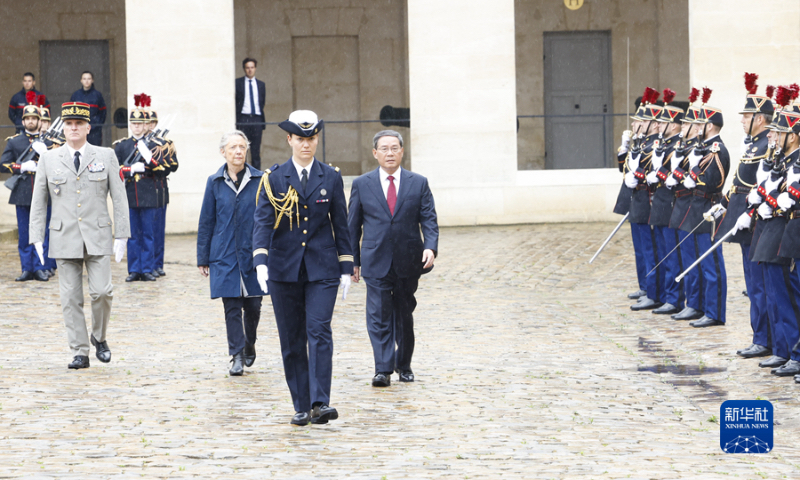Chinese Premier Li Qiang stressed on Thursday that China is ready to work with France to advance balanced development of bilateral trade, expand two-way market access, and optimize business environment in a bid to push “bilateral practical cooperation” to a new level while meeting with French Prime Minister Elisabeth Borne during the last stop of his ongoing first overseas visit since taking office.
Li also called on France to continue playing a positive role in facilitating Europe to form a more objective, rational perception and policy toward China, so as to make win-win cooperation between the two economies the main theme.
Analysts said on Thursday that Li’s visit to France will consolidate the good momentum of China and France relations built based on the consensus reached by the two heads of state following French President’s visit to China in April, serve to dispel misunderstandings of China in Europe amid “de-risking” rhetoric and avoid the potential widening of conflicts between China and Europe veering into confrontation. The trip will also help promote deeper engagement and cooperation between China and France, and China and Europe in industries, sci-tech, aerospace, corporate and other practical sectors.
Li pointed out that China is willing to work with France to promote the balanced development of bilateral trade, adhere to mutual benefit and reciprocity, expand market access, make the “pie of common interests” bigger, and promote practical cooperation to reach a new level, the Xinhua News Agency reported on Thursday.
“China always regards EU as an important pole in a multipolar world. Strengthening cooperation between China and Europe is a strategic choice based on each other’s respective interests, and China-Europe relationship is not targeted at any third party, nor is it subjugated to or controlled by any third party,” Li said.
He noted that both China and France are adhering to independence and autonomy, and are committed to maintaining a balanced, stable international order, and promote the world peace and development.
As next year marks the 60th anniversary of establishment of China-France diplomatic relations, the China-France Year of Culture and Tourism, and the Paris 2024 Summer Olympics, both sides will take the year as an opportunity to achieve a new peak in bilateral cultural and people-to-people exchange, according to Li.
For Borne’s part, she said that France welcomes Chinese investment, and vowed that the country would not take discriminative measures against Chinese companies. Meanwhile, the EU will adhere to strategic autonomy, and does not support “decoupling or severing supply chains” push.
After the meeting, Li and Borne witnessed the signing of multiple cooperation agreements in aviation, space research and nuclear energy.
The National Development and Reform Commission (NDRC), China’s top economic planner, has signed a letter of intent with French aerospace corporation Airbus in Paris on deepening aviation cooperation on Thursday. The two sides will facilitate the construction of Airbus’ new final assembly line in Tianjin as the next step, according to a post on the NDRC’s official Wechat account.
Li’s visit to France comes after French President Emmanuel Macron’s productive state visit to China in April. It is also the second leg of Li’s first overseas trip since taking office, which observers said underscores a high level of mutual respect that is built on stable political trust between China and France, and each other’s firm attachment to the positioning of bilateral relations that won’t be derailed by geopolitical noise and “de-risking” calls floated by certain European politicians.
How China-France relations forge ahead is also consequential for China-Europe relations, which are now at a crossroads amid Europe’s hot debate over its China strategy – with Washington having been ramping up pressure to rope in Europe allies based on its “small clique” mindset to target China’ rise. It is expected that France, leveraging its long-standing tradition of diplomatic autonomy, will “play a unique role” in driving China’s relations with Europe as well as the West in a positive momentum, analysts said.
Chinese Premier Li arrived in France on Wednesday afternoon to kick off an official visit. Upon his arrival in Paris, Li said China is ready to work with France to “turn the blueprint for the development of China-France relations drawn up by the two countries’ heads of state into working plans and reality,” the Xinhua News Agency reported.
In April, the leaders of the China and France reached a series of strategic consensuses, outlining a beautiful blueprint for China-France comprehensive strategic partnership and pointing out the direction for China-France cooperation at bilateral, China-Europe and global levels, Li said.
The premier said China is ready to work with France to expand two-way opening-up, build more resilient industrial and supply chains between China and France and between China and Europe, deepen people-to-people exchanges and mutual learning, and jointly address global challenges such as climate change and sustainable development, so as to inject new impetus into the sustained, sound and steady growth of China-France relations, and inject more confidence and strength into world peace, stability and development, according to the Xinhua report.
During his stay in France, Li will meet with Macron, hold talks with French Prime Minister Elisabeth Borne, and meet with French Senate President Gerard Larcher. He is also scheduled to attend the Summit for a New Global Financing Pact and deliver a speech.
Li arrived in Paris after concluding the seventh China-Germany inter-governmental consultation in tandem with an official visit to Germany.
Multiple signals
Observers said that there are multiple signals sent by Li’s visit.
Following Macron’s visit to China, China-France relations are in a comprehensive upward trend amid fluctuating China-Europe relations. Premier Li’s visit is aimed at further deepening and promoting the consensus reached by the two leaders, and taking advantage of the momentum to further advance bilateral relations to a higher level, Feng Zhongping director of the Institute of European Studies at the Chinese Academy of Social Sciences, told the Global Times on Thursday.
Cui Hongjian, director of the Department of European Studies at the China Institute of International Studies, told the Global Times on Thursday that the visit comes at a crucial junction with a number of European politicians have been calling for an adjustment in approach toward China under the US instigation. And the concept of “de-risking,” originally laid out by European Commission President Ursula von der Leyen, has been moving from obscurity to ubiquity in Europe’s China strategy debate.
The European Commission, the EU’s executive arm, unveiled a European Economic Security Strategy on Tuesday, which focuses on “minimizing risks” arising from certain economic flows in the context of rising geopolitical tensions.
“It is important that the visit highlights that the fundamentals of France’s relations with China, including its positioning of China as a comprehensive strategic partner, should not and never been altered by external noises. Pragmatic cooperation should be the mainstream,” Cui said, noting that the visit aims to serve as a strong hit-back to “de-risking” hype.
Feng noted that the current trend in Europe of “de-risking from China” is likely to cause varying degrees of damage to the core interests of both China and Europe. The “de-risking” discourse in Europe is largely based on a misjudgment of China and unrealistic imagination about China, and Premier Li’s visit is also conducive to dispelling those misunderstandings in Europe.
During meeting with Li on Tuesday, German Chancellor Olaf Scholz stressed that Germany opposes any form of de-coupling, and explained that “de-risking” is not “de-sinicization.”
During his trip , Li also attended a dinner with the Chinese and French business communities on Wednesday night. At a speech at the dinner, Li put forward a three-point proposal on deepening China-France cooperation.
The first is to call for the Chinese and French entrepreneurs to jointly maintain the security and stability of global industrial and supply chains. The other two points include strengthening China-France innovation cooperation, especially in potential sectors such as high-end manufacturing, modern service, green transformation and digital economy, as well as creating sound business environment for each other.
China will unswervingly push for deepening reforms and expanding opening-up, while it is hoped that the France will maintain market openness, and provide fair, justice, and non-discriminative business environment for Chinese enterprises, Li said.
Two-way opening-up is also a focal point, after some European countries showed a certain degree of backtracking from their opening-up commitments, with several policy frameworks being launched to block Chinese investment in the name of “economic security,” analysts said. “The continuous opening-up of China and Europe is equally important, as only in this way could both economies safeguard their joint interests,” Cui said.
Premier Li’s visit not only attaches importance to economic cooperation, but also to global and regional security issues, which is in line with France’s policy of seeking strategic autonomy, providing ample room for cooperation between the two sides, Feng said.
“France has a tradition of maintaining diplomatic autonomy, and is also a responsible global major power. So it is in the interests of China, France and other European politicians to avoid the potential widening of conflicts between China and Europe veering into confrontation,” Cui stressed.
The two countries will also serve as important forces in global governance as they could bridge the communication with developing and developed world, preventing the international system from falling into a unipolar order that is dominated by a single country’s hegemony, observers noted.
French President Emmanuel Macron could consider attending the BRICS summit if he is invited, French Foreign Minister Catherine Colonna said, following talks with South African Foreign Minister Naledi Pandor, the TASS reported.
She noted that France already interacts with some BRICS countries, including China, in various areas, and “it is logical that such cooperation could happen in various forms and forums,” the report added.
(Global Times)




